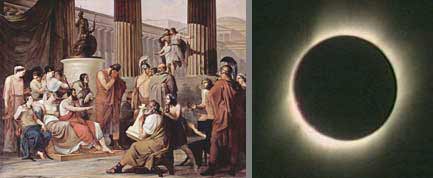Date Determined for Eclipse in Homer's Odyssey

In the epic "Odyssey," one of the cornerstones of Western literature, the legendary Greek hero Odysseus returns to his queen Penelope after enduring 10 years of sailing the wine dark sea.
Now scientists have pinned down his return to April 16, 1178 B.C., close to noon local time, according to astronomical references in the epic poem that seem to pinpoint the total eclipse of the sun on the day that Odysseus supposedly returned on.
The "Odyssey" is a millennia-old epic said to be composed by the blind poet Homer. In modern times, the "Odyssey" is typically seen as fiction. Still, Homer's earlier epic, the "Iliad," was centered on the war against Troy, and scientists first uncovered physical evidence of Troy in the 19th century. This has long raised questions as to what other historical facts the epics might refer to.
In the "Odyssey," after the decade-long Trojan War, King Odysseus of the island Ithaca contends with monsters and witches after he draws the wrath of the sea god Poseidon. After he finally returns home, Odysseus slays more than 100 unruly suitors all of whom wish to marry Penelope.
Blood red
The possible solar eclipse comes up in the 20th book of the "Odyssey," as the suitors begin their final lunch. At this point, the goddess of war Athena "confounds their minds," making the suitors laugh uncontrollably and see their food spattered with blood. The seer Theoclymenus then foresees the death of the suitors, ending by saying, "The sun has been obliterated from the sky, and an unlucky darkness invades the world."
The Greek historian Plutarch suggested the prophecy of Theoclymenus referred to a solar eclipse.
Get the world’s most fascinating discoveries delivered straight to your inbox.
More recently, astronomers Carl Schoch and Paul Neugebauer computed in the 1920s that a total solar eclipse occurred over the Ionian islands — of which Ithaca is one — about noon on April 16, 1178 B.C., and would have coincided roughly a decade before the most often cited estimate for the sack of Troy — about 1190 B.C.
Still, a great deal of skepticism remains over whether Theoclymenus refers to this or any eclipse. To shed light on the issue, researchers Marcelo Magnasco and Constantino Baikouzis at Rockefeller University in New York decided to analyze other passages in the "Odyssey" for astronomical references without assuming an eclipse.
The scientists first created a rough chronology of events depicted in the "Odyssey." First, 29 days before the supposed eclipse and the massacre of the suitors, three constellations are mentioned as Odysseus sets out from the island of Ogygia, where he has spent seven years as a captive of the beautiful nymph Calypso. Odysseus is told to watch the Pleiades and late-setting Boötes and keep the Great Bear to his left. Next, five days before the supposed eclipse, Odysseus arrives in Ithaca as the Star of Dawn — that is, Venus — rises ahead of the sun.
Finally, the night before the eclipse, there is a new moon.
Also, the messenger of the gods, Hermes, is sent west to Ogygia by the king of the gods Zeus to release Odysseus and then immediately returns back east roughly 34 days before the eclipse. The researchers conjecture this trip refers to an apparent turning point of the motion of the planet Mercury. (Mercury was the Roman name for Hermes.)
Backward planet
Mercury completes its orbit around the sun in just roughly 88 days, compared with the year it takes Earth to do so. This means that Mercury and Earth are somewhat like two cars moving along separate lanes of a racetrack at different speeds. The effect of these motions is that Mercury occasionally appears to go backward or retrograde in the sky from our point of view, Magnasco explained. This happens for roughly three weeks at a time, about three times a year.
The scientists then searched for potential dates that satisfied all these astronomical references close to the fall of Troy, which has over the centuries been estimated to have occurred between roughly 1250 to 1115 B.C. From these 135 years, they found just one date satisfied all the references — April 16, 1178 B.C., the same date as the proposed eclipse.
"That's just one day out of about 50,000 days," Magnasco told LiveScience. "If our findings are correct, it would be pretty spectacularly strange. How could Homer have known about this eclipse, about planetary positions that happened some 100 years before him? If this is all true, it would change the timetable of what we think they knew about astronomy then." Homer, if he really existed, is said to have composed the "Odyssey" sometime near the end of the ninth century B.C.
Magnasco and Baikouzis detailed their findings online June 23 in the journal Proceedings of the National Academy of Sciences.



